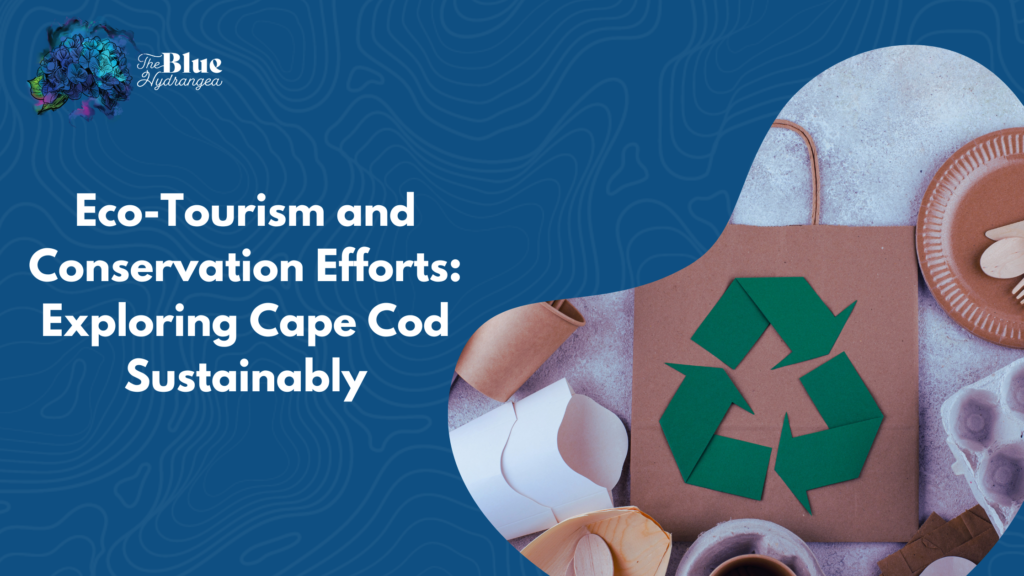Cape Cod is a destination of stunning natural beauty, from its windswept beaches to its salt marshes and protected wildlife habitats. However, with its popularity comes the responsibility to preserve its fragile ecosystems. By practicing eco-tourism and supporting local conservation efforts, visitors can enjoy the Cape’s beauty while helping to protect it for future generations.
Whether you’re interested in wildlife conservation, sustainable travel, or eco-friendly activities, this guide will introduce you to the best ways to experience Cape Cod while minimizing your environmental impact.
1. What is Eco-Tourism and Why Does It Matter?
Eco-tourism is all about traveling responsibly – reducing your environmental footprint while supporting local communities and conservation efforts. It focuses on:
- Protecting natural habitats and wildlife.
- Supporting local businesses that prioritize sustainability.
- Choosing activities that minimize environmental impact.
With Cape Cod facing threats from climate change, rising sea levels, and habitat loss, eco-tourism plays a vital role in ensuring this beloved region remains a thriving natural sanctuary.
2. The Best Eco-Friendly Activities on Cape Cod
There are countless ways to enjoy Cape Cod while respecting its environment. Here are some of the best eco-friendly activities to include in your trip.
Wildlife Watching & Nature Walks
Cape Cod is home to diverse wildlife, from seals and shorebirds to rare sea turtles. Explore these protected areas to see nature at its finest:
- Wellfleet Bay Wildlife Sanctuary (Wellfleet) – A Mass Audubon property featuring walking trails, salt marshes, and birdwatching opportunities.
- Monomoy National Wildlife Refuge (Chatham) – A pristine refuge protecting migratory birds and seals. Best explored by kayak or on a guided tour.
- Cape Cod National Seashore (Eastham to Provincetown) – With 40 miles of protected beaches and dunes, this is the heart of Cape Cod’s conservation efforts.
Eco-Tip: Always stay on designated trails to prevent erosion and protect fragile habitats.
Kayaking and Paddleboarding
Paddling along Cape Cod’s waterways is a peaceful way to experience its natural beauty without harming the environment. Rent a kayak or paddleboard and explore:
- Nauset Marsh (Eastham) – A serene paddling route where you can spot herons and osprey.
- Bass River (Dennis/Yarmouth) – One of the most scenic waterways on the Cape, with plenty of wildlife along the shores.
- Great Island Trail (Wellfleet) – Kayak along this untouched coastal area for a truly immersive nature experience.
Eco-Tip: Use biodegradable sunscreen to protect marine life while paddling.
Responsible Clamming and Shellfishing
For a hands-on eco-experience, try shellfishing in Cape Cod’s pristine waters. Towns like Wellfleet and Chatham offer shellfishing permits for recreational clamming.
- What to Bring: A rake, bucket, and a shellfish gauge (to ensure you collect legally sized clams).
- Where to Go: Wellfleet’s tidal flats or Chatham’s Oyster Pond are popular spots.
- Why It’s Sustainable: Cape Cod’s shellfishing industry is carefully regulated to prevent overharvesting and protect the ecosystem.
Eco-Tip: Always follow local regulations and size limits to ensure shellfish populations remain healthy.
3. Conservation Organizations Making a Difference
Cape Cod is home to several conservation groups that work tirelessly to protect its natural resources. Visitors can support these efforts by donating, volunteering, or simply learning more about their work.
Association to Preserve Cape Cod (APCC)
- What They Do: Focus on climate resilience, clean water initiatives, and habitat protection.
- How to Support: Participate in volunteer clean-up events or donate to support their projects.
The Center for Coastal Studies (Provincetown)
- What They Do: Protect Cape Cod Bay’s marine life, including whales, seals, and sea turtles.
- How to Support: Visit their exhibits, attend a lecture, or contribute to whale rescue programs.
Mass Audubon Cape Cod
- What They Do: Manage wildlife sanctuaries, provide education on conservation, and promote sustainable land use.
- How to Support: Join guided eco-tours or birdwatching walks led by naturalists.
Eco-Tip: Many of these organizations offer eco-tours—choosing these over commercial tourist operations ensures your money supports conservation.
4. Sustainable Travel Tips for Cape Cod Visitors
Visiting Cape Cod sustainably doesn’t require major sacrifices—just a few mindful choices can help preserve this beautiful region.
Where to Stay
- Choose eco-friendly accommodations like The Blue Hydrangea, which promotes sustainability with recycling programs, energy-efficient appliances, and environmentally friendly cleaning products.
- Look for rentals with bike access and walkability to reduce car use.
How to Get Around
- Bike the Cape Cod Rail Trail – This 25-mile path allows you to explore the Cape without driving.
- Use Public Transit – The Cape Cod Regional Transit Authority (CCRTA) offers bus routes connecting major towns.
- Carpool or Rent an Electric Vehicle – If you must drive, opt for an eco-friendly option.
Reduce Waste & Conserve Water
- Bring a reusable water bottle—Cape Cod has plenty of refill stations.
- Avoid single-use plastics and opt for reusable shopping bags.
- Take shorter showers to conserve Cape Cod’s limited freshwater supply.
5. Eco-Friendly Dining on Cape Cod
Supporting sustainable seafood and farm-to-table restaurants is a great way to promote eco-tourism.
Best Sustainable Seafood Restaurants
- Mac’s Seafood (Multiple Locations) – Known for its commitment to responsibly sourced seafood.
- The Naked Oyster (Hyannis) – An oyster bar that partners with local shellfish farmers.
- The Canteen (Provincetown) – A beachfront eatery using fresh, local ingredients.
Farm-to-Table Dining
- Ceraldi (Wellfleet) – A seasonal tasting menu featuring organic, locally sourced ingredients.
- Clean Slate Eatery (West Dennis) – A small restaurant with a rotating menu based on what’s fresh from the farm.
Eco-Tip: Ask if the seafood you’re ordering is locally sourced and sustainably harvested.
Why The Blue Hydrangea is Perfect for an Eco-Friendly Stay
If you’re looking for a place to stay that aligns with your eco-conscious values, The Blue Hydrangea in South Dennis offers the perfect balance of comfort and sustainability.
- Green Practices: Recycling, eco-friendly cleaning products, and energy-efficient appliances.
- Proximity to Nature: Easy access to beaches, biking trails, and wildlife sanctuaries.
- A Relaxing Retreat: Enjoy a peaceful, pet-friendly setting where you can reconnect with nature.
Plan Your Eco-Tourism Adventure on Cape Cod
By traveling sustainably and supporting conservation efforts, you can help protect Cape Cod’s natural beauty while enjoying everything it has to offer. Whether you’re kayaking through salt marshes, savoring sustainable seafood, or exploring wildlife sanctuaries, there are countless ways to experience the Cape in an environmentally friendly way.
Ready to explore Cape Cod responsibly? Book your stay at The Blue Hydrangea and experience eco-tourism at its best!









